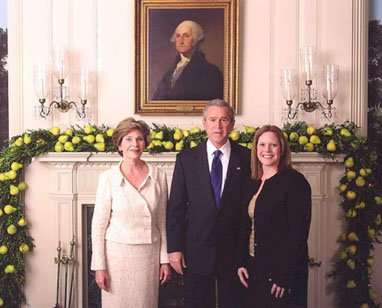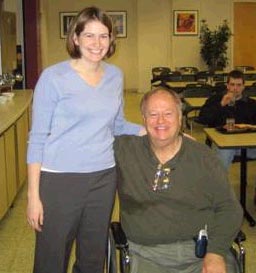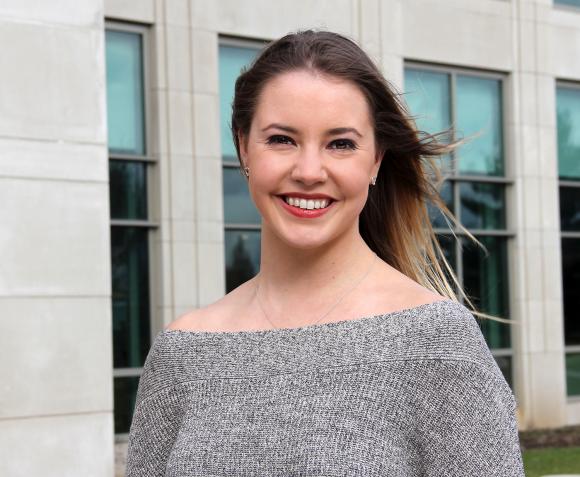 |
 |
| Lauren Fabina ('05) with President Bush and the First Lady | Sarah Staley ('06) with former Senator of Georgia Max Cleland |
"When I first arrived in Washington D.C., I remember thinking why would I ever leave Saint Mary's for this crazy place? But I soon feel in love with D.C. and everything it had to offer. The program combines lectures with well known speakers and an internship for professional work. I would not trade my D.C. experience for the world. EVERY political science major should go; this experience is more than worth it. Through my time in D.C., I found myself and was able to orient myself in the world of politics." -Blaine Nolan ('10)
Overview
A. Academic Credits:
Academics is the core of the Washington Semester Program. The semester system of American University consists of two quarters. The Seminar Series continues for two quarters for which the student earns 4 credits each quarter for a total of 8 credits. A letter grade is given for each quarter indicating two separate seminar courses. The Internship and the Research Project continue for both quarters for 4 credits each.
B. Eligibility:
A student must be a Political Science major and have taken POSC 201 and one other 200-level POSC course and have earned at least a C in each of those courses before attending the Washington Semester Program. Students planning to participate in the Foreign Policy Semester or the Peace and Conflict Resolution Semester must also have successfully completed POSC 206. A cumulative average of 2.5 is also required. Exceptions may be made for strong performance in Political Science courses and other mitigating circumstances but only after formal review by the Department faculty. In order to balance the numbers of candidates attending in fall and spring semesters, the Department will utilize academic criteria to select the most qualified students to fill its spring quota.
I. The Classroom, Seminar Series (8 Credit Hours -- 2 Quarters)
A. Field Sessions:
The Seminar Series consists primarily of meetings with public officials, political figures, lobbyists and others active in American national government. Sessions are held approximately four to five times a week, with most of them occurring in the field offices of the speakers concerned. These classes are oriented to your area of study and differ according to the program in which you are enrolled. You will frequently be required to meet the lecturer somewhere in downtown Washington, D.C. Consequently, many of your classes will require travel. This however, is part of the fun of participating in the Washington Semester Program. The field trips offer you a unique opportunity to experience the active world of Washington, D.C.
B. Class Sessions:
Some of your sessions will be spent in class lecture and discussion with your full-time faculty member. The purpose of these sessions is to provide you with the necessary background and knowledge of a broad range of governmental and political activity.
C. Content of Seminars: (National Political Science Program)
Normally the seminars focus on Congress and the Executive Branch for approximately eight weeks, political parties and pressure groups for three to four weeks, and the federal judicial process for three weeks. Current public policy concerns are integrated into the seminars to provide students with a sharper understanding of the interrelationship of the various actors in the political process.
D. Evaluation:
Faculty evaluate the students in the seminars on the basis of a series of short analytical papers, examinations, and participation.
II. The Internship (4 Credit Hours -- 2 Quarters)
Each student will spend two days a week working in her internship in whatever capacity is required by her office usually Monday-Tuesday or Thursday-Friday). Every student is required to find her own internship. Prior to arriving in Washington, your program director will send you a list of available internships. You should read through this list and check off those internships which seem to be of interest to you. After you have narrowed down this list, it is recommended, but not necessary, to write letters to these individuals or agencies, indicating that you would be interested in interning with them, and enclose a resume. If you are interested in "hunting out" your own unique internship, you have approximately two to three weeks at the beginning of your semester to interview and find a place to work. It is recommended that you explore all the internships that interest you in order to secure the most beneficial experience available to you over the entire semester. This may take some time, but don't panic if you do not accept the first internship that you are offered -- most students shop around and everyone eventually finds an internship of interest to them. Past placements have included congressional offices and committees, the Executive Branch, public interest groups, research think tanks, local government, and the Washington media. A variety of internships are available so that the student may select one of her particular interest.
III. The Research Project (4 Credit Hours -- 2 Quarters)
The research project is designed to give the student a depth of understanding of a single political problem or governmental activity, and to permit the student to explore fully a problem of individual interest to her.
Most appropriately, the research should focus on the legislative, administrative, or judicial phase of a specific domestic policy, or the methods used by an interest group to influence an area of policy or a political institution. The prospects for fresh research are so rich in the city that the student should use Washington as a laboratory. As such, the prime sources of information for the research project should include personal interviews, government reports, documents, and hearings.
A member of the academic staff at American University is responsible for working with the student in providing advice and feedback relating to the various stages of the research project.
You are required by the Department of Political Science of Saint Mary's College to utilize the research project of the Washington Semester Program to field research your Senior Thesis in Washington, D.C. In fact, you are selected for the program primarily on the viability of your research proposal. It is imperative, therefore, that you make the necessary effort to meet the following goals and guidelines.
- Select a Political Science advisor at Saint Mary's to oversee the formulation of your research project proposal.
- Establish the groundwork at Saint Mary's for your research in Washington by developing a proposal that includes the following ingredients:
- Introduction to the focus of the proposed study and clarification of the problem or problems to be studied and researched.
- Tentative hypotheses/research questions/areas of investigation.
- Projected outline of your study.
- A tentative bibliography -- books/articles/etc. -- that you plan to review prior to your arrival in Washington.Note: The Washington Semester thesis is not eligible for honors designation on the senior thesis.
The Department's Washington Semester representative is Prof. Sean Savage. You should contact him for further details. Students may also access www.washingtonsemester.com for more information.
Applications MUST go through the Department of Political Science.
"The Washington Semester program was an invaluable experience for me. I made contacts that will hopefully help me in the future, and I made lasting friendships all over the country and the world. Through the Foreign Policy program and my internship, I gained a new understanding of America and its place in the world, and also a clearer image of what I want to do with my life. My memories of my semester in DC are full of fun and great people and experiences, and I would recommend this program for everyone." -Kelli Ripp ('10)

